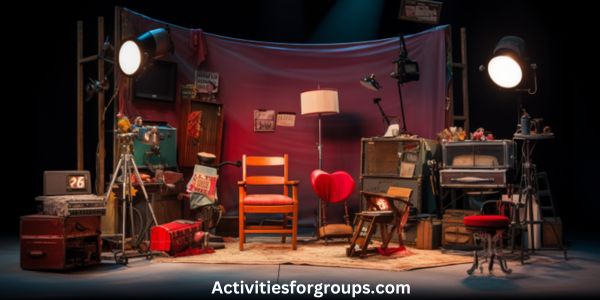Organizing a group theater workshop doesn’t have to be a daunting task. With the right materials, you can create a fun and educational experience for all involved.

In this article, we’ll look at the following aspects of organizing a theater workshop:
- Space requirements: Consider the size and layout of the space you’ll need to accommodate participants and activities.
- Supplies and equipment: Make a list of the necessary supplies and equipment, such as costumes, props, lighting, and sound equipment.
- Scripts and rehearsal materials: Gather a selection of scripts and rehearsal materials that are appropriate for the participants’ age and skill level.
- Promotional materials: Create promotional materials, such as flyers or social media posts, to attract participants to your workshop.
- Budget: Determine your budget and allocate funds for space rental, supplies, and any additional expenses.
- Logistics: Plan the logistics of the workshop, including scheduling, registration, and any special considerations for participants with disabilities.
So, let’s get started and get your theater workshop up and running!
Space Requirements
You’ll need a spacious room to organize successful group theater workshops. When planning your space requirements, be sure to consider the facilitator roles and the level of participant engagement. A large, open room with good acoustics is best for gathering the group and enabling the instructors to be heard. Additionally, if you plan to use any props or costumes, you’ll need space to keep them organized and accessible.
Make sure to provide comfortable seating for all participants. If you don’t have enough chairs, you can bring in additional seating, or arrange the room in a circle and suggest that participants sit on the floor. It’s important to ensure that everyone can see and hear the facilitators and each other.
Be aware of any safety considerations as well. If you plan to use any props that could potentially be hazardous, you’ll need to make sure they’re securely stored and out of reach of the participants. Additionally, the room should have ample lighting, good ventilation, and an emergency exit in case of an emergency.
Finally, consider the overall ambience of the room. Music and decorations can help to create an inviting atmosphere and set the tone for the workshop. Make sure the room is free of distractions so that the participants can focus on the activities at hand.
With the right space, your group theater workshops will be sure to be a success.
Supplies & Equipment

You’ll need certain supplies and equipment to organize successful group theater workshops. The first thing to consider is the type of activity you’ll be facilitating. Depending on the workshop, you may need materials for improvisation, scenework, or even costume selection. Additionally, it’s important to have a list of facilitation tips and techniques to ensure a successful workshop.
Next, you’ll need to consider the physical environment you’ll be working in and the supplies needed for the space. You should think about what type of seating arrangements you’ll need, as well as props and other materials. You’ll also need to have a plan for where the participants will work, and what type of equipment is necessary.
Finally, you’ll need to think about the costume selection. Depending on the type of workshop, you’ll need to figure out what type of clothing will work best for the participants. Consider what type of clothing is most comfortable and practical for the activity. Additionally, if you’re working with a group of actors, you may want to consider having costume pieces available for them to choose from.
Organizing group theater workshops requires a lot of planning and preparation. Make sure to consider all the supplies and equipment necessary to make the workshop a success. Consider the type of activity, the physical environment, and the costume selection to ensure an enjoyable and rewarding experience for all participants.
Scripts & Rehearsal Materials
When organizing group theater workshops, it’s important to have the right scripts and rehearsal materials to create a meaningful experience for your group. Rehearsal materials can help bring your group together, enabling them to explore scene work, develop group dynamics, and hone their craft. Here are some materials to consider:
- Scripts: Selecting the right scripts is key, as this is where your group will focus their energy. Choose scripts that are suitable for the size of your group and the time allotted for your workshop.
- Props: Props such as costumes, set pieces, and furniture can help your actors bring the story to life. Consider the script and how props can help bring the characters to life.
- Rehearsal Aid: Rehearsal aids such as music, sound effects, and cue cards can help your actors get into the moment. Consider how these tools can help your group bring the script to life.
Promotional Materials
Once you have selected your scripts, props, and rehearsal aids, you’ll need to consider promotional materials to advertise your group theater workshop. Networking strategies such as creating a website, joining online theater groups, and utilizing social media can be highly effective in reaching a larger audience and engaging them with your workshop. Flyers and posters are also great for advertising in public places and can be used to encourage people to join your workshop. Additionally, you should look into email marketing and email blasts to spread the word about the workshop.
Make sure to use a professional yet eye-catching design on all of your promotional materials. Include details about the workshop, such as the date, time, location, and cost. You should also include a brief description of the workshop, the plot of the play, and a list of the actors in the production. Finally, don’t forget to include contact information for anyone who might be interested in attending.
Budget & Logistics

Considering your budget and logistical needs is key to organizing a successful group theater workshop. You’ll need to think through the cost tracking of the workshop, as well as the venue scouting and other related expenses.
To ensure you stay on budget, here are three tips you should keep in mind:
- Create a spreadsheet to document expenses and other related costs. This will help you keep track of your budget and ensure you don’t go over.
- Consider the venue carefully. It should be large enough to accommodate the group and have enough space for theater activities.
- Don’t forget to factor in supplies and other materials. Make sure you have props, costumes, and other items you may need to make the workshop a success.
Organizing a group theater workshop requires a lot of work and planning. With proper cost tracking and careful venue scouting, you can ensure you have a successful event that remains within your budget.
Frequently Asked Questions [FAQs]
What Experience Do I Need to Run a Group Theatre Workshop?
You need experience in role play and group dynamics to effectively run a theatre workshop. Try attending workshops or working with a group to gain these skills.
What Is the Best Way to Keep Participants Engaged?
To keep participants engaged, focus on building strong team dynamics and fostering positive group dynamics. Encourage collaboration, support each other, and strive for creative solutions.
How Do I Choose the Right Script for the Workshop?
Choose a script that facilitates character development and encourages imagination. Consider the participants’ interests and abilities when selecting material. Think about the workshop’s goals and objectives and choose a script accordingly.
How Should I Structure the Workshop?
You should structure the workshop to focus on building trust and group dynamics. Start by discussing the goals of the workshop and how to best accomplish them. Set aside time for activities that help foster collaboration and understanding.
How Can I Ensure the Workshop Is Safe and Inclusive for All Participants?
Ensure the workshop is safe and inclusive by setting clear expectations, utilizing role playing to practice group dynamics, and creating an open environment for feedback.
Conclusion
Organizing group theater workshops can be a fun and rewarding experience. It requires careful thought and planning. Make sure you have the right space, supplies, scripts, and promotional materials. Additionally, having a budget and logistical plan in place is crucial.
With the right preparation, you’ll be ready to lead an engaging and successful workshop!




Leave a Reply